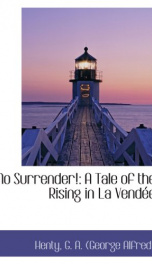No Surrender!

In the world's history, there is no more striking example of heroicbravery and firmness than that afforded by the people of the provinceof Poitou, and more especially of that portion of it known as LaVendee, in the defence of their religion and their rights as free men.At the commencement of the struggle they were almost unarmed, and thesubsequent battles were fought by the aid of muskets and cannon wrestedfrom the enemy. With the exception of its forests, La Vendee offeredno natural advantages for defence. It had no mountains, such as thosewhich enabled the Swiss to maintain their independence; no rivers whichwould bar the advance of an enemy; and although the woods and thicketsof the Bocage, as it was called, favoured the action of the irregulartroops, these do not seem to have been utilized as they might havebeen, the principal engagements of the war being fought on open ground.For eighteen months the peasants of La Vendee, in spite of the factthat they had no idea of submitting either to drill or discipline,repulsed the efforts of forces commanded by the best generals Francecould furnish; and which grew, after every defeat, until at lengtharmies numbering, in all, over two hundred thousand men were collectedto crush La Vendee.The losses on both sides were enormous. La Vendee was almostdepopulated; and the Republicans paid dearly, indeed, for theirtriumph, no fewer than one hundred thousand men having fallen, on theirside. La Vendee was crushed, but never surrendered. Had the Britishgovernment been properly informed, by its agents, of the desperatenature of the struggle that was going on; they might, by throwingtwenty thousand troops, with supplies of stores and money into LaVendee, have changed the whole course of events; have crushed theRepublic, given France a monarch, and thus spared Europe over twentyyears of devastating warfare, the expenditure of enormous sums ofmoney, and the loss of millions of lives.G. A. Henty --This text refers to an alternate Paperback edition.
Info about the book
Author:
Series:
Unknown
ASIN:
B0083ZVV0C
Rating:
0.5/5 (40)Your rating:
0/5
Languge:
English
Users who have this book
Users who want this book
What readers are saying
What do you think? Write your own comment on this book!
write a commentif you like No Surrender! try:
Other books by this author
Do you want to exchange books? It’s EASY!
Get registered and find other users who want to give their favourite books to good hands!


